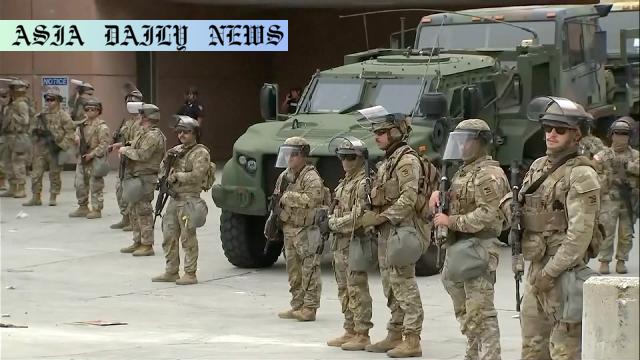National Guard troops have been deployed in Los Angeles by President Trump to address violent protests over immigration crackdowns.
The National Guard has been deployed in Los Angeles to suppress protests.
Over 120 protesters gathered following immigration raids in LA.
President Trump called the deployment a move to restore order.

Introduction: National Guard Deployed to Los Angeles
The streets of Los Angeles witnessed a rare and controversial deployment of the National Guard, following orders from President Donald Trump aimed at suppressing violent protests sparked by immigration-related crackdowns. Tensions escalated after the US Immigration and Customs Enforcement (ICE) carried out a series of large-scale operations targeting undocumented immigrants, an action that not only attracted outrage but also saw protesters clash with law enforcement. President Trump’s decision to deploy 2,000 National Guard troops marks an unusual move, typically requiring a governor’s request. This federal intervention raises questions about constitutional protocols and its implications for civil liberties.
Protests Emerge in Response to Immigrant Crackdowns
On Friday, federal ICE agents conducted high-profile operations targeting undocumented immigrants in several neighborhoods of Los Angeles. These operations, criticized by many advocacy groups as heavy-handed, led to immediate public backlash. Protesters flooded downtown Los Angeles late Saturday, with a group of around 120 people taking to the streets. While most of these demonstrations initially began as peaceful expressions of dissent, a segment of the crowd reportedly turned violent, resulting in clashes with authorities. Law enforcement arrested 11 protesters for allegedly defying authority orders, escalating tensions in an already fraught atmosphere.
The Unprecedented Federal Intervention
President Trump’s decision to mobilize 2,000 National Guard personnel, bypassing the usual protocol that involves state governors, represents a significant escalation. The National Guard is traditionally under state control, only federalized when extreme emergencies arise. This decision did not come in response to a request from California’s governor, but instead was directly mandated by Trump. His remarks to the press underscored a firm stance, as he labeled the protests “lawless riots” and emphasized a need to safeguard federal operations. Analysts have noted that such a deployment could further inflame tensions, complicating efforts to address the root causes of dissent.
Political and Public Reactions
The deployment of the National Guard in Los Angeles has sparked a wave of diverse reactions across political and social spectrums. Supporters of the move argue that the federal government has a responsibility to enforce laws and ensure order when local authorities fail. On the other hand, critics have raised concerns about the militarization of responses to civil protests and the potential erosion of democratic norms. Prominent civil rights organizations have decried the decision, urging dialogue and reform rather than military intervention. Meanwhile, ongoing social media discussions reveal divided public opinion, underscoring the broader divide over immigration policies and their enforcement.
Presidential Justification and Future Implications
In his statements, President Trump framed the deployment of the National Guard as an essential step to bolster federal ICE efforts and restore order against “violent mobs.” His declaration that Los Angeles is under threat of “insurrection” raises critical questions about the framing of immigration-related protests. Analysts speculate whether this move is a precursor to stricter federal actions, noting the implications for other cities grappling with similar challenges. The deployment further underscores the need for a nuanced approach that balances law enforcement with a commitment to addressing systemic issues at the heart of public unrest.
Conclusion: A Path Forward
The decision to deploy 2,000 National Guard troops in Los Angeles adds another chapter to the unfolding narrative of federal immigration policies and their societal repercussions. The escalated federal response underscores the urgency of addressing widespread discontent, not only through enforcement but also through systemic overhauls. Moving forward, dialogue among legislators, advocacy groups, and citizens will be critical to mitigate tensions and foster solutions that uphold democratic principles while addressing security concerns. Time will reveal whether this deployment achieves its intended goals or further entrenches divisions in an already polarized social landscape.
Commentary
A Controversial Deployment of Federal Authority
The recent deployment of National Guard troops in Los Angeles raises profound questions about the balance of federal intervention and states’ autonomy. As we observe this significant event, it’s critical to dissect not only its immediate implications but also its long-term impact on governance and public trust. The choice to deploy forces without the governor’s request deviates from established norms, posing challenges to constitutional frameworks designed to balance power between state and federal entities.
The Spotlight on Immigration Policy
The root cause of these protests lies in the contentious immigration policies that have defined President Trump’s administration. While addressing unlawful immigration is vital for national security, the aggressive tactics employed in LA have reignited debates about the humanity and morality of such measures. The protests that followed highlight the deep-seated divide between those who advocate for stricter enforcement and those who seek comprehensive reform rooted in compassion and fairness.
Balancing Order with Civil Liberties
While restoring order is undoubtedly essential, deploying military support to handle civil unrest can set a troubling precedent. Such actions risk escalating violence rather than de-escalating tensions, as history has shown in similar scenarios. The militarization of responses to protests may silence dissent in the short term but risks alienating communities and eroding public trust in governance over time.
Final Thoughts
Ultimately, the unfolding situation in Los Angeles serves as a stark reminder of the tension between enforcing laws and protecting civil liberties. It calls for a measured approach—one that prioritizes dialogue and systemic reform while addressing public concerns about lawlessness. Despite the complexities, there remains hope for solutions that bridge divisions and foster understanding, ensuring a fairer and more just society for all.


